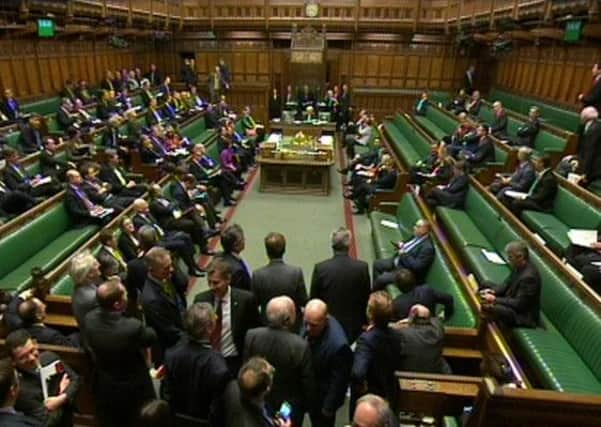Three-parent babies backed with DNA law


The move allows IVF babies to be created with three people’s DNA in a bid to prevent inherited diseases.
Yesterday’s historic decision was taken in a free vote after a debate on the controversial issue of mitochondrial donation in the Commons.
Advertisement
Hide AdAdvertisement
Hide AdOpposing the plans were 128 MPs from all sides of the House, including Justice Secretary Chris Grayling and Attorney General Jeremy Wright.
Several Yorkshire MPs voted against allowing DNA to be modified, including Tories Philip Davies, Anne McIntosh, Andrew Percy, Graham Stuart and Craig Whittaker.
Also objecting was Liberal Democrat Greg Mulholland and Labour MP George Mudie.
Among the 382 MPs voting to allow doctors to pioneer the new technique was Prime Minister David Cameron. Labour leader Ed Miliband and Deputy Prime Minister Nick Clegg were also in favour.
Advertisement
Hide AdAdvertisement
Hide AdThe decision still has to be agreed by peers before becoming law but once passed will mean Britain becomes the first country in the world to legalise the pioneering techniques.
Moving the plans, Health Minister Jane Ellison said the techniques offered the “only hope” for some women who carry the disease to have “healthy, genetically-related children” who will not suffer from the “devastating and often fatal consequences” of mitochondrial disease.
Ms Ellison said mitochondrial donation had been subject to “extensive scrutiny” throughout the Parliament, adding the Government believed it was right for the current cohort of MPs to have a say on the next step.
She said mitochondrial DNA is 0.054% of a person’s overall DNA and none of the nuclear DNA which determines personal characteristics and traits.
Advertisement
Hide AdAdvertisement
Hide AdMs Ellison told MPs: “We have within our reach the possibility of eradicating mitochondrial disease and families who have been blighted by it for generations, families who have endured a disease for which there is no cure.
“They have suffered daily battles with painfully debilitating symptoms and have sadly lost their children prematurely.
“Families who have had to face up to the risk and perhaps the certainty that to be a parent must come at the expense of a difficult and, in too many cases, painful life for their children.”
Conservative MP Fiona Bruce warned against the measures, telling MPs they were a “red line” which should not be crossed.
Advertisement
Hide AdAdvertisement
Hide AdShe said: “Once this alteration has taken place, once the genie is out of the bottle, once the procedures we are being asked to authorise go ahead, there will be no going back for society, and certainly not for the individuals.”
The Roman Catholic Church reiterated its opposition to mitochondrial donation after the vote.
Bishop John Sherrington, speaking for the Bishops’ Conference of England and Wales, said: “While the Church recognises the suffering that diseases bring and hopes that alternative methods of treatment can be found, it remains opposed on principle to procedures where the destruction of human embryos is part of the process.
“This is about a human life with potential, arising from a father and a mother, being used as disposable material.”